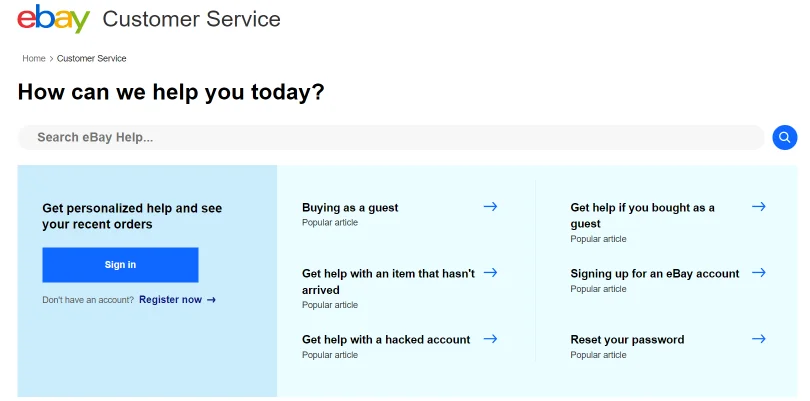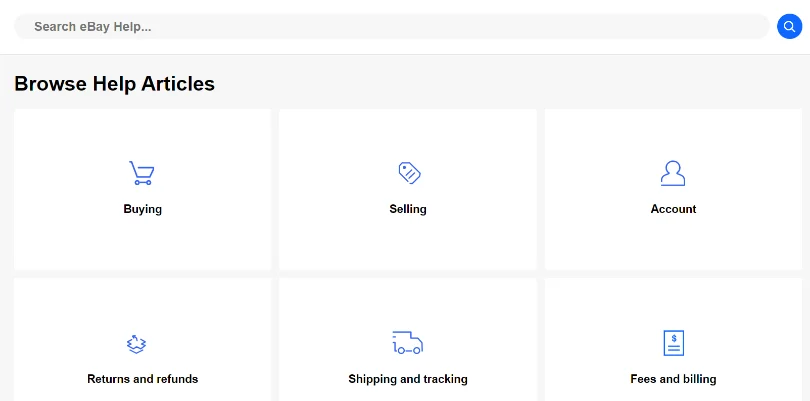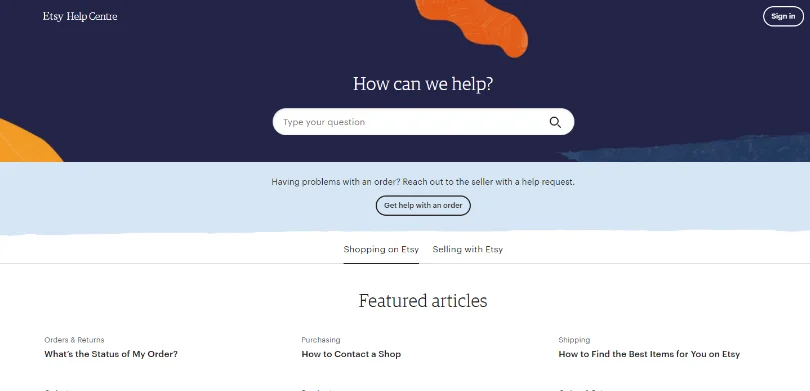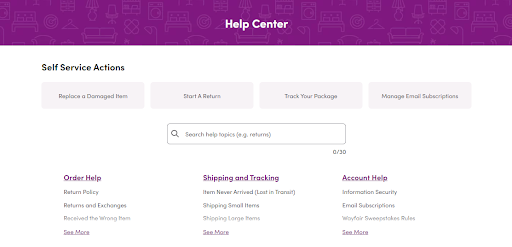Amazon.
That’s what instantly pops up in the mind when we come across the term ecommerce, right?
Why is that so?
With top-notch and diverse products, super-fast deliveries, smooth refunds, and a lot more, Amazon is clearly dominating most of the digital space.
When the gold standard is set, the competition gets tougher. What makes the competition even stiffer is the growing number of companies joining the ecommerce bandwagon every year.
Amidst all of this, how do you make a mark?
You can either catch the ecommerce wave or get swept by it – the choice is yours!
Replicating what big-box retailers are doing is not possible for every business, but what is in your hands is how well you serve your customers. If you make them feel good, they are yours!
An ecommerce knowledge base is a useful resource that helps you survive and thrive in the online marketplace. Dive into this blog to learn all about how a knowledge base can win more customers and drive sales for your ecommerce business.
What is an Ecommerce Knowledge Base?
An ecommerce knowledge base is a go-to place where prospects and customers can find accurate answers to any questions they have about a company’s products, service, payment, refunds, and more. It is a comprehensive resource offering 24×7 access to necessary information customers need before, during, and even after the purchase is made.
An effective knowledge base doesn’t just cover surface-level information. Instead, it dives deeper into everything customers need and offers essential help content on troubleshooting problems, step-by-step instructions, and other supporting documents.
Why is Ecommerce Knowledge Base Indispensable for Your Online Business?
Look at big shots in ecommerce. Most of them have a fully functional knowledge base for customer support. This speaks volumes about why creating a knowledge base is crucial for ecommerce businesses.
But if this is not convincing enough, the statistic below will do the work.
A surprising 90% of customers today expect brands to provide a self-service portal for quick issue resolution.
Why you may wonder.
That’s because a self-service help center is convenient, reliable, and quicker than traditional support channels like emails and calls. Customers are therefore more inclined towards self-service portals.
For an ecommerce business, having a comprehensive knowledge base with useful information can be a big plus. Such portals help customers self-resolve issues and get familiar with your offerings, policies, and much more on their own, thus reducing cart abandonment and improving your sales.
Let’s explore the benefits of an ecommerce knowledge base in detail in the next section.
Notable Benefits of an Ecommerce Knowledge Base
Today’s customers have sky-high expectations from brands. They are so accustomed to getting what they need, right when they need it, that even a slight delay can be the cause of frustration, cart abandonment, and eventually lost sales.
An ecommerce knowledge base is a magic bullet that can solve these problems and many more. Here are the key benefits you can glean by creating an ecommerce help center your customers can’t resist.
Improves Customer Experience
Customers want quick answers. They don’t have the patience to email or call you in the middle of a transaction, that too for minor issues. With an ecommerce knowledge base, customers have the ability to independently solve problems arising during online transactions or while using your products. Minimum friction and maximum efficiency improve ecommerce customer experiences that further translate into higher customer satisfaction and loyalty.
Relieves Agents From Answering Common Questions
Ticket overload is a common problem most ecommerce businesses face. Most of these tickets are for common issues, which should ideally be solved at the customers’ end. Such repetitive questions increase agents’ workload, and the risk of serious customer queries slipping through the cracks. An ecommerce knowledge base empowers customers to solve common problems on their own, allowing agents to focus their time and energy on complex cases.
Elevates Your Search Engine Visibility
There is a simple rule to online businesses – Out of sight means out of mind.
Ecommerce is a highly competitive space where every company is vying for customer attention. More attention means more traffic. The higher the traffic, the more the chances of sales and profit. An ecommerce knowledge base can improve your search engine ranking and bring more traffic to your website. With good quality content, relevant keywords, and the right intent, your knowledge base has a high chance of getting a spot in the top search results.
Provides Clarity to Customers
How to get a refund, how to change the delivery address, what are the return policies, and many such questions can pop up in a customer’s mind during the online purchase. This information might be present on your website, in sections hidden in some corner. But, what’s the use if customers don’t find the information right when they need it.
An ecommerce knowledge base is a central hub where customers can find all information they need. This gives them instant clarity around what they can expect from you and whether they should proceed with the purchase.
Drives Sales & Profits
An ecommerce knowledge base can grow your sales too. As surprising as it might sound, but it is true.
Understand that a knowledge base is not just for your existing customers, it is for your prospects too. So anyone visiting your website for the first time can refer to the knowledge base to get familiar with your offerings, purchase process, payment, refunds, etc. Easy access to this information helps them make informed purchase decisions faster, thus boosting your sales and profits.
What Should You Include in Your Ecommerce Knowledge Base?
An ecommerce knowledge base covers everything customers need to purchase from you and use your products. It includes ecommerce help articles related to:
- Products and services
- Payment and refund process
- FAQs
- Return and exchange policies
- Company details
- Managing and tracking orders
- Contact information
- Terms and conditions, and a lot more.
A knowledge base can be structured with broad categories and subcategories for each topic to help customers locate information easily.
FREE. All Features. FOREVER!
Try our Forever FREE account with all premium features!
How to Boost Your Ecommerce Business With a Knowledge Base
Whatever products your ecommerce business deals in – clothes, accessories, electronics, or food items, having a knowledge base is a must. For existing customers, it acts as a useful resource that helps them troubleshoot problems and achieve a lot more with your products than they imagined.
On the other hand, for prospects, the knowledge base assists them at every step, ensuring a smooth purchase experience – all this without any agent intervention.
That’s the beauty of a knowledge base. It puts customers in the driver’s seat and lets them do the work on their own. That’s also a major reason more and more customers today are preferring self-service portals over emails and calls. Self-service enables customers to get quick assistance, any time of the day, without putting in the effort to contact your team.
The result?
Your sales figure goes up, and you have an army of happy customers who want to stick to your company.
What more?
Happier customers are more likely to indulge in repeat purchases and turn into brand loyals over time. They are people who buy from you multiple times and sing your praises in their social circle. Even if you are able to retain 5% of your customers, profit can soar between 25 – 95%, according to research by Bain & Company.
Building an ecommerce knowledge base with the best knowledge base software is clearly a smart step in the right direction if happier customers and long-term business growth are your top goals.
Top 5 Ecommerce Knowledge Base Examples
It’s finally time to see some powerful knowledge platforms in action and get inspired.
Here are a few examples of knowledge bases created by popular ecommerce brands that will motivate you to build your own.
Amazon
With the level of traffic Amazon gets and the popularity it has garnered in recent years, it is clearly the leader in the ecommerce industry.
Over 197 million people visit Amazon every month. That’s way more than the entire population of New Zealand and Canada combined. Let that sink in!
It is not practically possible even for an organization like Amazon to solve a large number of customer issues without a knowledge base.
Amazon’s knowledge base is quite comprehensive, with broad topics covered in the beginning.

As you scroll down, you will find more topics offering detailed information about returns, refunds, shipping policies, etc. The search bar is placed at the center to help customers find information quickly. All common topics are neatly arranged for easy scanning so that customers can instantly move to the page they are interested in.
eBay
Another ecommerce giant that has a full-fledged knowledge base is eBay.
eBay has a beautifully structured knowledge base with a prominent search bar right at the top. Common help topics are listed in the beginning for customers to use to get the assistance they need.

The knowledge base also has other popular help articles related to shipping, returns, and refunds. On clicking, every topic shows more categories with detailed information on each one of them.
On the surface, eBay’s knowledge base looks simple, but as you dive deep, there is an ocean of information waiting to be explored.

Zappos
Zappos is a popular ecommerce company dealing in clothes and shoes. Being a highly popular brand, it has a wide customer base spanning across the globe.
The company’s knowledge base is in the form of simple FAQs, neatly structured, and clearly explained as you click on each question. The questions are segregated into broad categories such as returns, payment, billing, etc., to help customers identify the articles they are looking for in just a glance.

FAQs are good, but it’s ideal to have proper ecommerce knowledge base content with detailed articles, guides, and how-to videos for better customer service.
Etsy
Etsy’s knowledge base is Goals. It has a beautiful design, clean structure, and it is built for both shoppers and sellers. Under the search bar, there are common help topics, and below that, there are articles related to user accounts and orders. Etsy’s knowledge base content strategy is focused on human support as well. So, in case customers need help with an order or want to talk to a representative directly, they can do that too.

Walmart
Walmart has a comprehensive knowledge base. It looks plain from the outside as the company has invested more in the quality of information it provides. From FAQs to help articles to human support, Walmart’s knowledge base has covered it all. It has a search bar and major categories listed right at the top, making the browsing experience hassle-free for customers.

Wayfair
Wayfair is one of the leading brands in the online retail of furniture and home decor. Its knowledge base not only looks appealing but is easy to navigate as well. Wayfair has taken a different route by listing the common self-service actions at the top. This means most customers do not have to browse through all the sections for common issues. Next, the knowledge base articles are segmented into different categories, and there is also the option to contact the company directly.

Take Your Ecommerce Business to New Heights
Sustaining and succeeding in the ecommerce industry is a road full of challenges. Competition is intense, with new players coming in every year, and customers are spoilt for choice, making it even harder to stay afloat.
One thing that can help you is customer service. If you are good with it, people will remember you. Today customer service is all about making things easier for customers, to the point that they don’t have to approach you, at least not for common queries.
A comprehensive, well-structured knowledge base is, therefore, a necessity. Equipping your customers with a fully functional knowledge base makes purchase and problem solving easier. With a seamless self-service experience, customers are happier and more likely to make repeat purchases, directly impacting your sales figure.
Invest in ecommerce knowledge base software today and level-up your customer service.
 Tips
Tips
We’d love to hear your tips & suggestions on this article!
FREE. All Features. FOREVER!
Try our Forever FREE account with all premium features!

 We'd love your feedback!
We'd love your feedback! Thanks for your feedback!
Thanks for your feedback!







